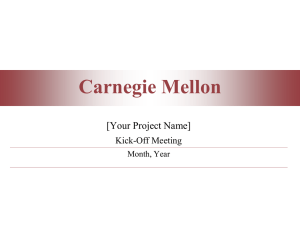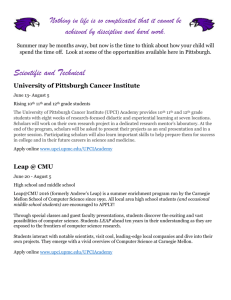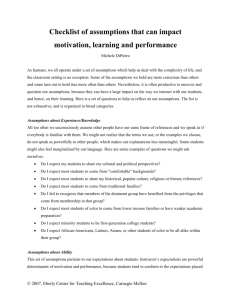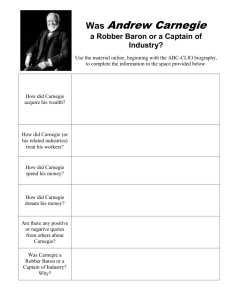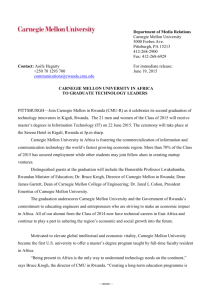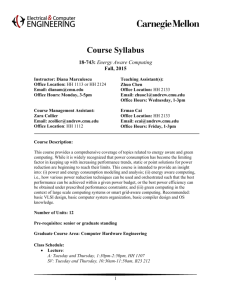Academic Integrity Code - Electrical and Computer Engineering
advertisement
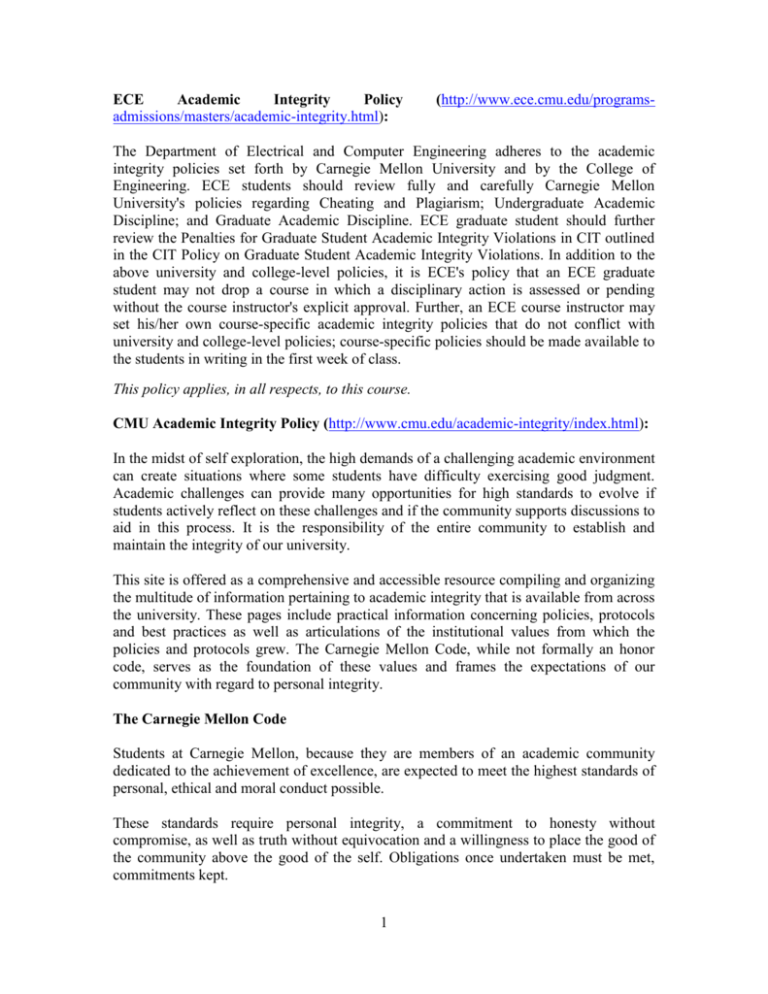
ECE Academic Integrity Policy admissions/masters/academic-integrity.html): (http://www.ece.cmu.edu/programs- The Department of Electrical and Computer Engineering adheres to the academic integrity policies set forth by Carnegie Mellon University and by the College of Engineering. ECE students should review fully and carefully Carnegie Mellon University's policies regarding Cheating and Plagiarism; Undergraduate Academic Discipline; and Graduate Academic Discipline. ECE graduate student should further review the Penalties for Graduate Student Academic Integrity Violations in CIT outlined in the CIT Policy on Graduate Student Academic Integrity Violations. In addition to the above university and college-level policies, it is ECE's policy that an ECE graduate student may not drop a course in which a disciplinary action is assessed or pending without the course instructor's explicit approval. Further, an ECE course instructor may set his/her own course-specific academic integrity policies that do not conflict with university and college-level policies; course-specific policies should be made available to the students in writing in the first week of class. This policy applies, in all respects, to this course. CMU Academic Integrity Policy (http://www.cmu.edu/academic-integrity/index.html): In the midst of self exploration, the high demands of a challenging academic environment can create situations where some students have difficulty exercising good judgment. Academic challenges can provide many opportunities for high standards to evolve if students actively reflect on these challenges and if the community supports discussions to aid in this process. It is the responsibility of the entire community to establish and maintain the integrity of our university. This site is offered as a comprehensive and accessible resource compiling and organizing the multitude of information pertaining to academic integrity that is available from across the university. These pages include practical information concerning policies, protocols and best practices as well as articulations of the institutional values from which the policies and protocols grew. The Carnegie Mellon Code, while not formally an honor code, serves as the foundation of these values and frames the expectations of our community with regard to personal integrity. The Carnegie Mellon Code Students at Carnegie Mellon, because they are members of an academic community dedicated to the achievement of excellence, are expected to meet the highest standards of personal, ethical and moral conduct possible. These standards require personal integrity, a commitment to honesty without compromise, as well as truth without equivocation and a willingness to place the good of the community above the good of the self. Obligations once undertaken must be met, commitments kept. 1 As members of the Carnegie Mellon community, individuals are expected to uphold the standards of the community in addition to holding others accountable for said standards. It is rare that the life of a student in an academic community can be so private that it will not affect the community as a whole or that the above standards do not apply. The discovery, advancement and communication of knowledge are not possible without a commitment to these standards. Creativity cannot exist without acknowledgment of the creativity of others. New knowledge cannot be developed without credit for prior knowledge. Without the ability to trust that these principles will be observed, an academic community cannot exist. The commitment of its faculty, staff and students to these standards contributes to the high respect in which the Carnegie Mellon degree is held. Students must not destroy that respect by their failure to meet these standards. Students who cannot meet them should voluntarily withdraw from the university. This policy applies, in all respects, to this course. Carnegie Mellon University's Policy on Cheating (http://www.cmu.edu/academicintegrity/cheating/index.html) states the following: According to the University Policy on Academic Integrity, cheating "occurs when a student avails her/himself of an unfair or disallowed advantage which includes but is not limited to: Theft of or unauthorized access to an exam, answer key or other graded work from previous course offerings. Use of an alternate, stand-in or proxy during an examination. Copying from the examination or work of another person or source. Submission or use of falsified data. Using false statements to obtain additional time or other accommodation. Falsification of academic credentials.” This policy applies, in all respects, to this course. Carnegie Mellon University's Policy on Plagiarism (http://www.cmu.edu/academicintegrity/plagiarism/index.html) states the following: According to the University Policy on Academic Integrity, plagiarism "is defined as the use of work or concepts contributed by other individuals without proper attribution or citation. Unique ideas or materials taken from another source for either written or oral use must be fully acknowledged in academic work to be graded. Examples of sources expected to be referenced include but are not limited to: Text, either written or spoken, quoted directly or paraphrased. Graphic elements. 2 Passages of music, existing either as sound or as notation. Mathematical proofs. Scientific data. Concepts or material derived from the work, published or unpublished, of another person." This policy applies, in all respects, to this course. Carnegie Mellon University's Policy on Unauthorized Assistance (http://www.cmu.edu/academic-integrity/collaboration/index.html) states the following: According to the University Policy on Academic Integrity, unauthorized assistance "refers to the use of sources of support that have not been specifically authorized in this policy statement or by the course instructor(s) in the completion of academic work to be graded. Such sources of support may include but are not limited to advice or help provided by another individual, published or unpublished written sources, and electronic sources. Examples of unauthorized assistance include but are not limited to: Collaboration on any assignment beyond the standards authorized by this policy statement and the course instructor(s). Submission of work completed or edited in whole or in part by another person. Supplying or communicating unauthorized information or materials, including graded work and answer keys from previous course offerings, in any way to another student. Use of unauthorized information or materials, including graded work and answer keys from previous course offerings. Use of unauthorized devices. Submission for credit of previously completed graded work in a second course without first obtaining permission from the instructor(s) of the second course. In the case of concurrent courses, permission to submit the same work for credit in two courses must be obtained from the instructors of both courses." This policy applies, in all respects, to this course. Carnegie Mellon University's Policy on Research Misconduct (http://www.cmu.edu/academic-integrity/research/index.html) states the following: According to the University Policy For Handling Alleged Misconduct In Research, “Carnegie Mellon University is responsible for the integrity of research conducted at the university. As a community of scholars, in which truth and integrity are fundamental, the university must establish procedures for the investigation of allegations of misconduct of research with due care to protect the rights of those accused, those making the allegations, and the university. Furthermore, federal regulations require the university to have explicit procedures for addressing incidents in which there are allegations of misconduct in research.” The policy goes on to note that “misconduct means: 3 fabrication, falsification, plagiarism, or other serious deviation from accepted practices in proposing, carrying out, or reporting results from research; material failure to comply with Federal requirements for the protection of researchers, human subjects, or the public or for ensuring the welfare of laboratory animals; or failure to meet other material legal requirements governing research.” “To be deemed misconduct for the purposes of this policy, a ‘material failure to comply with Federal requirements’ or a ‘failure to meet other material legal requirements’ must be intentional or grossly negligent.” To become familiar with the expectations around the responsible conduct of research, please review the guidelines for Research Ethics published by the Office of Research Integrity and Compliance. This policy applies, in all respects, to this course. 4

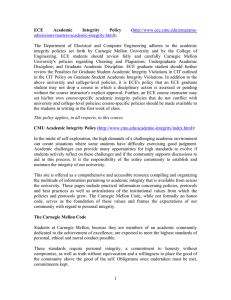
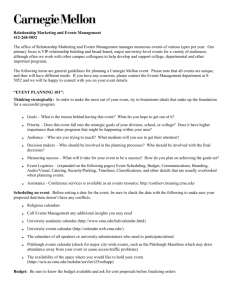
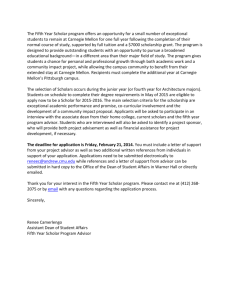
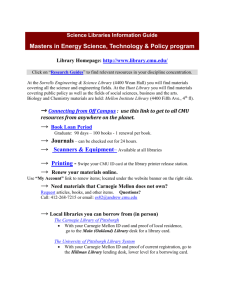
![Design [.doc] - Carnegie Mellon University](http://s3.studylib.net/store/data/006995311_1-eb72da5c4467c1170c224b569aff7837-300x300.png)
